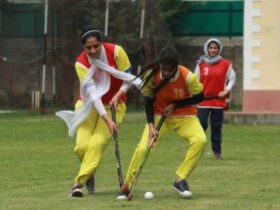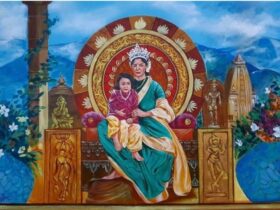Writes Shahzad Hussain Hamdani
“As you sit here by me, you’re just like my mother,”
she tells me. I imagine her: a bride in Kashmir,
she’s watching, at the Regal, her first film with Father.
If only I could gather you in my arms, Mother,
I’d save you–now my daughter–from God. The universe
opens its ledger. I write: How helpless was God’s mother!
Today, while going through the pages of Kashmir’s History of Conflict and sacrifices, brought me close to a person, who had been one of those who not only said but in real terms died for the true cause of humanity and for the Greater cause of Kashmir Conflict. A person, who every Kashmiri has forgotten, a person who could have lived a luxurious life, but he left his luxurious life in England , just in order to come to the rescue of starving and ragged people of Kashmir. A Man who took the path of sufferings just in order to be remembered not as a Name but as a real soldier of Kashmir.
A hero who gave his life for Kashmir in the 19th century. Born in England, the hero named Robert Thorp highlighted the miserable plight of the hapless Kashmiris and paid a huge price. He was killed and lies buried in the Sheikh Bagh Christian graveyard.
Robert Thorp’s father visited Kashmir in those fateful days. It was there he came across a Kashmiri girl and lost his heart to her. They married and went to England. Robert Thorp grew up in the kind lap of his Kashmiri mother who would tell him stories about Kashmir and the sufferings of the people who lived in the most beautiful part of the world. And, finally when junior Thorp visited the paradise on earth he was mesmerized by its beauty. However, the sufferings of the people and the way the rulers behaved with them pained him. He decided to help Kashmiris and came out openly against the then Dogra rulers. “Thorpe’s posthumously published book ‘Cashmere Misgovernment’ is perhaps the first book giving information on the taxation system, shawl industry, begar (forced unpaid labour under the Dogras), the 1846 Amritsar treaty between Maharaja Gulab Singh and the British government and other aspects of life in Kashmir,”
The following excerpt is from his book
Those gaily-coloured threads of wool are not the only ones which these looms weave to their completion. Threads of life, more costly than those of the soften pashm, whose price will be demanded by Heaven yet, are spun out there on the loom of sickness and suffering. Death or flight are the only doors of release open to the heavy-laden shawl bafs; and thus we have arrived at an understanding of the causes which have produced those extensive emigrants of the Cashmere shawl bafs to the Punjab.
His audience were the British readers to whom he informs:
oh! British reader! Forget not that these and other frightful miseries are produced by a Government whose chief is a feudatory of the British crown by a government into whose hands British statesmen sold the people of Cashmere. It is at once a memorial of that foul act, when, like the arch traitor of old, we bartered innocent lives, which fate placed in our hands, far a few pieces of silver.
The activities of Robert Thorp gave sleepless nights to the rulers who employed every overt and covert method to silence him. However, he proved a hard nut for them and did not budge an inch from his stand. Instead he chose to become the first martyr of Kashmiris’ struggle for independence.
This is why is it said, “We are not here to triumph by fighting, by stratagem, or by resistance, nor to fight with beasts as men. We have fought the beast and have conquered. We have only to conquer now by suffering. This is the easier victory.”
Unfortunately, the natives ignored their hero. Very few people know about him. Nobody has worked on him other than the renowned intellectual Fida Muhammad Husnain. Even the successive governments that ruled Kashmir after the fall of Dogra empire in 1947 failed to make a mention of him.
The Coalition of Civil Society, an amalgam of several voluntary organizations constituted an award in his honour three years ago. The first award was given to an American Patricia Gosman for her works on Kashmir. Another award went to Aasiya Jeelani who was killed in a landmine explosion at Kupwara while monitoring Parliamentary elections. This year the award has not been given till date. The society has also published some literature and now people have started recognizing him as a national hero.
People especially those involved in a struggle for the enforcement of their rights must know their roots. They must know the persons who stood up for their cause.
According to most historical accounts, the Dogra rulers were disturbed by Thorpe’s criticism, and deported him from the state. However, Thorpe managed to sneak back, but died on November 22, 1868 under ‘mysterious conditions’ at the age of 30. It is believed that Thorpe had to pay with his life for his outspoken criticism of the Dogra autocracy.
The government also cannot escape responsibility. Most of the Kashmiris believe that the freedom struggle started in 1931. Had the government taken appropriate measures and presented Kashmiri history without distortions Robert Thorp would be a household name in contemporary Kashmir. Let people know their heroes. Let the world know how Kashmiris have suffered and at whose hands.
Just it is said that the difference between a man who faces death for the sake of an idea and an imitator who goes in search of martyrdom is that whilst the former expresses his idea most fully in death it is the strange feeling of bitterness which comes from failure that the latter really enjoys; the former rejoices in his victory, the latter in his suffering.
















Leave a Reply